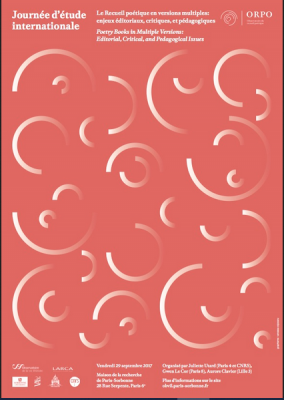2017, September 19

Most poetry books exist in various, often strikingly different, versions. Walt Whitman’s Leaves of Grassis a case in point, though hardly an exception. These internal reshufflings and outward transformations—whether they modify the order, number, or titles of individual poems, or the book’s general format, layout, cover, and paratextual framework—deeply affect the content, shape, and reception of the poems themselves. And yet we tend to read, study and teach poetry as if poetry books were stable, easily identifiable objects. What happens when the poetry book is approached notas a single, sacred format supposedly frozen in time, but as an unstable, multiple, historicized object? Situated at the intersection of textual practice, book history, and digital education, this conference will examine “Poetry Books in Multiple Versions” from an editorial, critical, and pedagogical perspective. As digital technology makes it possible to gather all existing versions into one place, providing online access to the general reader (not just the scholar), how might we make way for “poetry books in multiple versions” in critical discussions of poetry, both in and out of the classroom? To what extent should these editorial variations affect the way we, as poetry scholars, teach and study poetry? How might these multiple versions ultimately challenge our assumptions about poetry, and redefine reading and writing practices in the digital age?Each of the six invited speakers will address ways in which the different existing versions of poetry books by American poets have raised—or might yet raise—important critical, editorial andpedagogical issues in the digital age. The 25 min talks (followed by 15 min discussion) will touch upon all three aspects of the topic, though some speakers may choose to dwell on any two of the three issues at stake. All participants (speakers, organizers, audience) will also be invited to take part in an informal workshop-type discussion, offering suggestions about how scholars might build a digital edition of a poetry book in its multiple versions that might benefit the teaching of poetry at university level.

